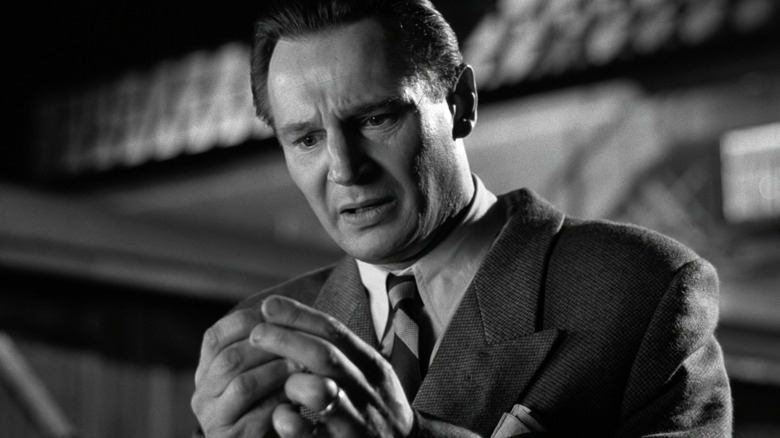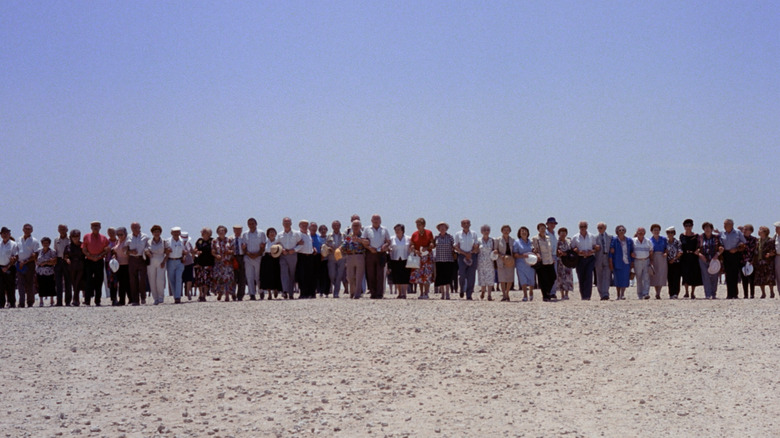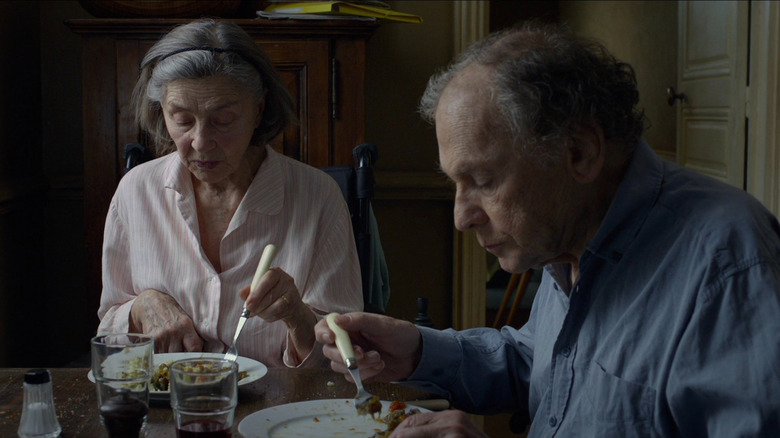Schindler's List Helped Renew Steven Spielberg's Faith In Filmmaking
I think it is fairly safe to say that "Schindler's List" is one of the most important films to come out of the Hollywood system. Sure, there's the trivial stuff like it finally earning Steven Spielberg his Academy Awards for Best Picture and Best Director, which he has shockingly never won before, and launching actors Liam Neeson and Ralph Fiennes to the A-list. That's all well and good, but it goes far beyond that.
For many people, "Schindler's List" showed the horrors of the Holocaust as they had never been seen before. The visceral nature of Spielberg's filmmaking planted people directly in the concentration camps and occupied ghettos to such an extent that it was truly terrifying. Reading about the Holocaust in a textbook in a classroom setting may not necessarily clue you into the real human casualties and fear of the Jewish people at that time. It also tells a story about the value of basic human empathy, of putting yourself out there to try and help just one person. Every time I see the film, my heart aches and breaks for over three hours, yet when I am done, I do feel there is a possibility for people to better understand one another, even if the real world rarely wants to do so.
The impact of "Schindler's List" does not stop at a cinema level in the slightest, and nobody is more keenly aware of that than Steven Spielberg. He may have needed Robin Williams to call him up on a weekly basis to cheer him up while shooting the film, but he has not lost sight of what good has come out of "Schindler's List." Its legacy has continued to shape Spielberg's own life. As he said in a news conference during the film's 20th anniversary [via The Hollywood Reporter]:
"I still feel that 'Schindler's List' is the film that has made the most amount of material change in the world ... When I went to Poland to start working on 'Schindler's List,' I quickly realized after a couple of days of filming that this just wasn't a natural reflex of my filmmaking instincts — this was going to be something that was going to change my life."
The Shoah Foundation
The year after "Schindler's List" came out, Steven Spielberg founded the USC Shoah Foundation. This is a nonprofit organization that seeks to document interviews with survivors of not just the Holocaust, but genocides anywhere. In the 28 years since its creation, they have amassed over 55,000 interviews with survivors. Documenting these people and their stories is invaluable in the education of future generations about the atrocities perpetrated all over the world. These are not just a collection of numbers on a ledger. These are people, and every single person's life matters. Every detail, every emotion, every circumstance is vital to understand if we want to move forward as a society.
Without Steven Spielberg making "Schindler's List," the Shoah Foundation probably never would have been created. The end of the film sees all the real-life survivors of the events of the picture visit the grave of Oskar Schindler. I imagine having all of these people together, in the present day, amplified the need in Spielberg to get their stories and everyone else's stories out there in the best way he knew how: filming them.
Spielberg is fully aware that this is a completely rare afterlife for a movie to have. In 1993, he released another film, "Jurassic Park," and while that film has spawned a franchise, it has not done the kind of work that actually truly benefits society. Later in that conference, he would go on to say:
"None of us make movies thinking they are going to do anything other than come out on all the other ancillary markets, come out on DVD and come out on television and that's going to be it ... The shelf life of 'Schindler's List' has renewed my faith that films can do good work in the world, but it's up to people to allow those images to be impressionable, to last and for people to do something about it."
For me, it remains a perfect, evergreen, indispensable film.
Not everyone is a fan
As with any movie, "Schindler's List" did not appeal to everyone. One such detractor is the acclaimed Austrian filmmaker behind "Funny Games," "Caché," and "Amour," Michael Haneke. While he is known for putting some truly upsetting and vile stuff in his films, he finds how Steven Spielberg crafted "Schindler's List" to be in poor taste, to put it mildly. During a roundtable with The Hollywood Reporter, Haneke delivers some rather harsh criticism of the film:
"The idea, the mere idea of trying to draw and create suspense out of the question whether out of the shower head, gas is going to come or water, that to me is unspeakable ... Anything that treats such a subject as entertainment is for me unspeakable."
I understand where he is coming from, to a point. The horrific shower scene that he singles out, to me, works because we are meant to have the same fear that the people in that situation do. I don't think I would consider it to be "entertainment." I would rather describe it as "empathetic." I find it horrifying like I find Haneke's "Amour" horrifying, because seeing this woman fall further and further into dementia truly upsets me. The difference may be that "Amour" is a fictional story, while "Schindler's List" is based on reality, but the condition Emmanuelle Riva's character goes through is still very real.
Haneke, I love you man, but we are going to have to agree to disagree on "Schindler's List," and I am obviously not the only one.


